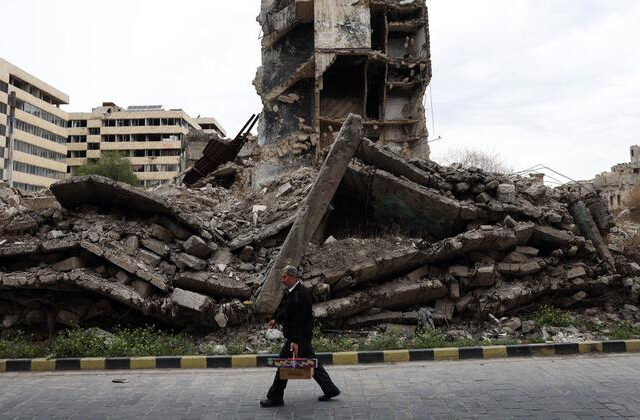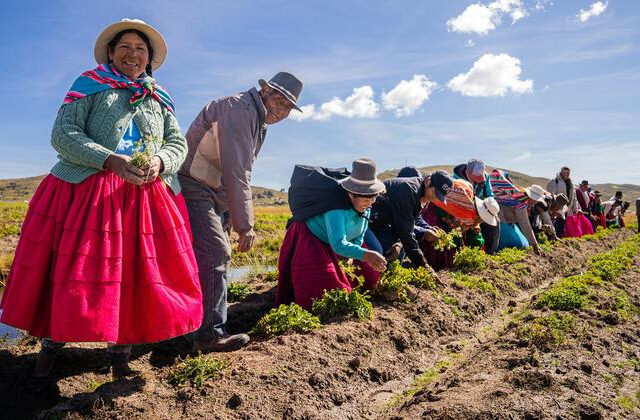- A funding stoppage hurts efforts to phase out polluting home cookstoves and replace them with cleaner alternatives.
The Trump administration’s gutting of the US Agency for International Development, with 80% of its programs now canceled, is a blow for clean cookstove programs in Africa. That means more Africans will have to rely on burning wood or charcoal in their homes, driving air pollution, deforestation and greenhouse gas emissions across the continent.
Clean cookstoves run on electricity, gas or smaller amounts of biomass, and switching households to less polluting cooking methods reduces harmful impacts. Health and environmental advocates for years have promoted clean cooking as an affordable, win-win solution. But the stoppage of US aid has left many projects in limbo.
“Funding is drying up, and the impact is real,” said Mattias Ohlson, chief executive officer of Emerging Cooking Solutions in Zambia. “These programs can make a difference between a company getting off the ground or not.”
About a third of the global population cooks on open fires or basic stoves, burning charcoal, coal, firewood, agricultural waste or animal dung. The resulting air pollution contributes to 3.7 million premature deaths annually, according to the International Energy Agency (IEA), with women and children most at risk of effects like respiratory complications and heart disease. The practice is also responsible for about 2% of global emissions, says the Stockholm Environment Institute.
Africa Clean Cooking Struggles to Take Off
Clean cooking campaigns have been largely successful in Asia and Latin America, but efforts in Africa have been unable to outpace population growth. Today, 1 billion Africans rely on highly polluting fuels to cook their meals. The continent would need an investment of $4 billion annually to achieve universal access to clean cooking by 2030, according to the IEA.
For small African companies that sell clean cooking fuels and devices, USAID grants were often an essential first step toward scaling up production and eventually accessing funds from other development agencies and the private sector. Without them, entrepreneurs are scrambling.
A spokesperson for the State Department said clean cooking programs do not fit within the standards for foreign assistance laid out by US Secretary of State Marco Rubio, which call for making the US stronger, safer or more prosperous. The department, which oversees USAID, will continue to adjust the mix of its programs, the spokesperson said.
USAID officials stopped answering emails from their work accounts in March, according to grantees interviewed for this story, following a chaotic six-week review of all projects run by what was the world’s largest aid agency.
“We were told overnight to stop what we were doing,” said Ohlson. “It was very abrupt.”
The radical cuts to US foreign aid by President Donald Trump and his efficiency czar Elon Musk prompted a flurry of lawsuits and a public outcry over the end of programs targeting HIV and AIDS, malaria, tuberculosis, maternal health and child malnutrition. The impact on clean cooking won’t cost lives in the short term, but a slower deployment will limit the benefits longer-term, company leaders say.
Ohlson’s Emerging Cooking Solutions running a project with waste biomass pellets for cooking under Alternatives to Charcoal, a $25 million project managed by Tetra Tech Inc. and funded by USAID. Although work was almost finished and most money had been spent, some funding was still frozen, Ohlson said. If completed, the project was estimated to cut charcoal consumption in Zambia by a quarter and reduce deforestation attributed to charcoal production by 6.7%. Tetra Tech did not reply to a request for comment.
For BioLite, a solar and clean cooking provider with presence in 20 countries in Africa, the withdrawal of USAID was a big setback. The Nairobi-based company had been awarded $1.5 million to deploy just under half a million clean stoves in three years.
“We have not been able to replace the funding, so it has meant downscaling the size of investment in markets where we had planned to scale up,” said Ethan Kay, BioLite’s managing director of emerging markets. “We’ll still be able to do it, but at a slower pace.”
Raising funding from the private sector remains a challenge on the continent.
Some companies are turning to carbon markets for financing, after countries agreed on rules for a global carbon market mechanism at the COP29 climate summit in Azerbaijan last November. The deal, which establishes how countries should trade carbon credits and sets the framework for bilateral trades, includes clean cooking programs as well as more conventional initiatives like tree-planting.
BioLite has made progress raising funds that will cover the initial costs of making its products eligible for the carbon market, which will help subsidize the price of cookstoves and make them cheaper for the final consumer, Kay said. But the company doesn’t have the same amount of funds that USAID would have ensured.
A number of carbon offsets programs traded in voluntary markets have been found to be ineffective or to exaggerate their climate benefits, and clean cooking credits are no exception. Last March, the non-profit Integrity Council for the Voluntary Carbon Market concluded that four different methodologies to measure the effectiveness of clean cooking programs lacked best practices to demonstrate efficacy in reducing emissions. (The Integrity Council is funded in part by Bloomberg Philanthropies, the philanthropic organization of Michael Bloomberg, founder and majority owner of Bloomberg LP.) A recent report commissioned by a South Korean non-profit analyzed a sample of clean cooking projects and found they were likely generating 18 times more credits than they should.
Getting funding from the regulated carbon markets won’t happen overnight, said Madrin Maina, country director for Kenya at Sistema.bio. The company, which operates in Latin America, Africa and Asia, offers farmers a device called a biodigester that collects organic waste from animals and transforms it into renewable biogas that can be used to fuel farming machinery, fertilize fields or cook.
Like many other clean cooking businesses, Sistema.bio got off the ground partly thanks to USAID funds. Although the company didn’t have USAID support at the time of the agency’s demise, it has noticed a tightening of other funding streams too, as some governments have narrowed their funding guarantees from about seven years to five or fewer, according to Maina.
“USAID has withdrawn and governments are focusing more their budgets on defense and other strategies,” she said. “Unfortunately, the impact will be far and wide.”
Sistema.bio was already trading carbon credits on unregulated carbon markets and is now transitioning into carbon markets under United Nations rules. But for these markets to work, African countries need to sign bilateral agreements with developed nations that would buy the credits. It’s a slow process and the company is actively lobbying the Kenyan government and others in the continent to try to speed it up.
“It’s not automatic,” Maina said. “But it’s a pivot and we have to start somewhere.”







I went over this site and I conceive you have a lot of excellent information, saved to favorites (:.
6oge50
xdu9pp
Dubai şirket kurma süreci, girişimciler ve yatırımcılar için sadece Orta Doğu’nun değil, dünyanın en cazip iş fırsatlarını sunan merkezlerinden biri olma özelliğini taşımaktadır; vergi avantajları, uluslararası pazara kolay erişim, stratejik konum, güçlü altyapı ve iş dostu hükümet politikaları sayesinde, her yıl binlerce yabancı yatırımcı Dubai’de şirket kurmak için başvuru yapmaktadır. Dubai’de şirket kurma seçenekleri arasında Mainland (kara içi), Free Zone (serbest bölge) ve Offshore (deniz aşırı) şirket türleri yer almakta olup, her biri farklı avantajlar sunmaktadır; örneğin Free Zone şirketler %100 yabancı sahipliğe izin verirken, Mainland şirketler yerel pazarda ticaret yapma özgürlüğü tanır. Dubai şirket kurma işlemleri, öncelikle uygun bir iş alanı seçilerek başlar, ardından ticari unvan rezervasyonu, faaliyet izni alma, ofis kiralama, gerekli belgelerin hazırlanması ve lisans başvurusu gibi adımlar takip edilir. Şirketin türüne göre değişkenlik gösteren belgeler arasında pasaport kopyaları, kurucu sözleşmeler, iş planı, vize başvuruları ve yerel sponsor anlaşmaları gibi evraklar bulunur. Dubai’de şirket kurmanın en cazip yönlerinden biri de gelir ve kurumlar vergisinin olmaması, aynı zamanda serbest bölgelerde KDV muafiyetleri ve ithalat-ihracat işlemlerinde gümrük vergisi avantajları ile yatırımcıların maliyetlerini ciddi oranda düşürmesidir. Ayrıca, Birleşik Arap Emirlikleri’nin 100’den fazla ülkeyle yaptığı çifte vergilendirmeyi önleme anlaşmaları, uluslararası iş yapan firmalar için önemli bir güvence sağlar. Dubai’de şirket kurduktan sonra banka hesabı açma, çalışan vizesi alma ve e-devlet kayıtları gibi tamamlayıcı işlemlerin de hızlı bir şekilde ilerlemesi mümkündür; çünkü Dubai hükümeti bu süreçleri yatırımcılara kolaylık sağlamak amacıyla dijitalleştirmiştir. Dubai şirket kurma maliyetleri ise kurulan şirketin türüne, faaliyet alanına, lisans türüne ve seçilen bölgeye göre değişkenlik gösterir; örneğin serbest bölgelerde ofis zorunluluğu bulunmayabilirken, mainland şirketlerde fiziksel ofis kiralama zorunluluğu vardır. Özellikle dijital girişimciler, danışmanlık hizmeti veren şirketler ve e-ticaret alanında faaliyet göstermek isteyenler için Dubai’nin serbest bölgeleri büyük avantajlar sunar; Dubai Internet City, Dubai Media City veya DMCC gibi bölgeler, sektörel altyapısı ile öne çıkar. Dubai’de şirket kurarken profesyonel danışmanlık hizmeti almak, prosedürlerin karmaşıklığını azaltmak ve hatasız ilerlemek açısından büyük önem taşır; çünkü Birleşik Arap Emirlikleri yasaları zaman zaman güncellenebilmekte ve bu da sürecin uzman desteğiyle yürütülmesini gerekli kılmaktadır. Dubai şirket kurma süreci, Türk yatırımcılar için de oldukça avantajlıdır; çünkü BAE ile Türkiye arasında gelişen ekonomik ilişkiler, vize kolaylıkları ve karşılıklı ticari anlaşmalar sayesinde Türk girişimciler, Dubai’de kuracakları şirketlerle hem Körfez pazarına hem de Afrika ve Asya pazarlarına kolaylıkla erişebilirler. Ayrıca Dubai, güvenli yaşam koşulları, modern şehir altyapısı, İngilizce’nin iş dünyasında yaygın kullanımı, düşük bürokrasi seviyesi ve kaliteli işgücü ile iş kurmak isteyen girişimciler için ideal bir ortam sağlar. Dubai şirket kurmak, sadece vergi avantajı sağlamakla kalmaz, aynı zamanda markanızı küresel ölçekte konumlandırma, uluslararası yatırımcılarla iş birliği yapma ve prestij kazanma anlamına gelir. 2025 yılı itibariyle Dubai’de şirket kurma sürecinde dijital başvuru sistemleri sayesinde tüm işlemler uzaktan gerçekleştirilebilir hale gelmiştir; bu da dünyanın herhangi bir yerinden Dubai’de şirket sahibi olma imkânını sunar. Dubai’de şirket kurma işlemlerinde dikkat edilmesi gereken en önemli unsurlardan biri de yasal düzenlemelere tam uyumdur; lisans türü dışında çalışan sayısı, faaliyet kapsamı, sermaye şartları ve yıllık raporlama yükümlülükleri gibi faktörler iyi analiz edilmeli ve kurumsal yapı buna göre şekillendirilmelidir. Özellikle fintech, blockchain, sağlık teknolojileri, yeşil enerji, dijital pazarlama ve ihracat gibi alanlarda faaliyet göstermek isteyen firmalar için Dubai, yatırım destek programları ve iş kuluçka merkezleriyle büyüme fırsatları sunmaktadır. Dubai şirket kurma işlemlerini tamamladıktan sonra uluslararası markalaşma sürecine geçiş yapan pek çok firma, Dubai merkezli bir yapı sayesinde hem Körfez ülkelerine açılmakta hem de global yatırımcılardan daha kolay destek almaktadır. Tüm bu avantajlar göz önünde bulundurulduğunda, Dubai şirket kurma adımı sadece bir yatırım tercihi değil aynı zamanda stratejik bir büyüme hamlesi olarak değerlendirilmelidir; çünkü Dubai, dinamik iş ekosistemi, hızlı işlem altyapısı, dijital devlet çözümleri ve yatırımcı dostu yasalarıyla 21. yüzyılın en yenilikçi iş merkezlerinden biri olma yolunda ilerlemektedir.
Great insights! This really gave me a new perspective. Thanks for sharing.